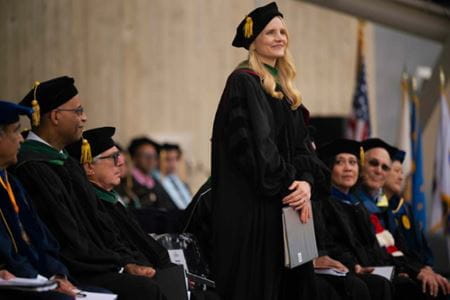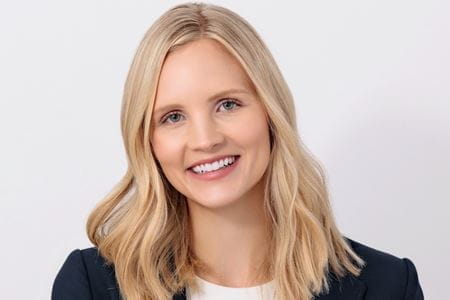As a gastrointestinal oncologist, Laura Vater, MD, MPH, treats patients with aggressive cancers — and delivers devastating news every day she’s in the clinic. Eight out of 10 of her patients don’t survive their cancers. Over the years, she’s wrestled with how to maintain compassion without sabotaging her own mental health.
During her medical training at the Indiana University School of Medicine, she turned to writing as an outlet for emotions, an avenue for honesty and a balm for weariness of body and spirit. Vater has now made it her mission to promote humanism in medicine for the wellbeing of both physicians and their patients.
Narrative medicine mixes medical science with the humanities, using storytelling as the medium for personal connection. Every patient has a story that goes far beyond their current illness or injury. And so does the doctor directing that patient’s care.
“Narrative medicine is something that helps me to pause, to slow down, to see the humanity in my patients, and also to hold on to my own humanity,” said Vater, an assistant professor of clinical medicine at the IU School of Medicine and a member of the IU Melvin and Bren Simon Comprehensive Cancer Center.
At the medical school, Vater co-founded a Writing for Wellness group to help her colleagues process their own emotions and experiences through creative writing. At any given time, Vater is simultaneously working on a novel and a narrative essay. She writes about “topics shrouded in shame” like mental health, medical error, compassion fatigue and moral injury.
“I love practicing medicine, but writing is my time when everything is quiet and I’m sipping tea and just getting to be creative,” Vater said. “Medicine is often hurry, rush, perform. Writing is process, creativity, and stillness.”
 Vater’s writing can be found on her personal website and spans topics including clinical practice, medical training, health and wellness, relationships and parenthood. She has a social media following of more than 185,000 people across multiple platforms including Instagram, Threads, X and TikTok. She acts as a “micro mentor” through text exchanges with medical students, residents and fellows across the nation.
Vater’s writing can be found on her personal website and spans topics including clinical practice, medical training, health and wellness, relationships and parenthood. She has a social media following of more than 185,000 people across multiple platforms including Instagram, Threads, X and TikTok. She acts as a “micro mentor” through text exchanges with medical students, residents and fellows across the nation.
“I've followed Dr. Vater on social media for years and had the opportunity to work with her in her clinic during my third year,” said IU medical student Natalie Jacobson. “She is the kindest person and the smartest person all at the same time, and that combination makes her striking and special. Her words of wisdom on social media are so relatable and resound with me and many of my close medical school friends.”
Vater was invited to give a TEDx talk at Rush University and was a commencement speaker for the University of Minnesota Medical School in 2023 and for the University of San Diego Medical School in 2024.
On Jan. 28, Vater will host a virtual talk on “Humanism in Medicine” for the IU School of Medicine community, sponsored by the Gold Humanism Honor Society. Vater, a 2018 inductee, participated in the first cohort of the Gold Writing Workshop with author Judith Hannan in 2021.
“My goal is to make the field of medicine more human, for both patients and clinicians,” she said.
Sharing her story
While Vater may seem the embodiment of success, she talks more about her struggles than her accomplishments. She shares her most vulnerable moments, like the time, as a severely sleep-deprived medical resident, she visualized driving off the road and ending her life.
“I saw this pattern of really scary thoughts that came when I was exhausted and utterly depleted,” Vater said. “I didn’t know then that sleep deprivation is an independent risk factor for suicide. It was the face of my daughter, who was 2 at the time, that kept me on the road.”
 She tells her story in a video project with the IU School of Medicine Department of Mental Health Services, aimed at removing the stigma around physicians seeking mental health support. At the time, Vater didn’t seek help because she was “terrified” it might affect her next steps toward becoming an oncologist.
She tells her story in a video project with the IU School of Medicine Department of Mental Health Services, aimed at removing the stigma around physicians seeking mental health support. At the time, Vater didn’t seek help because she was “terrified” it might affect her next steps toward becoming an oncologist.
“There was a lot of shame,” she said. “Everyone else around me seemed to be OK. I wondered, ‘Am I defective?’”
Through the support of friends, better sleep and mental health counseling during her fellowship years, Vater regained wellness. She came to understand that she wasn’t alone. And she wanted the “little whispers” to be spoken out loud.
“Being awake for 24 hours is the same as having a blood alcohol content of 0.10%. That’s higher than the legal limit for driving,” Vater says in one of her recent TikTok videos. “If doctors aren’t fit to use their driver’s license after 24 hours awake, should they be asked to use their medical license?”
Four years of data-backed advocacy resulted in policy change for Vater’s department, which has now eliminated most 28-hour shifts for residents — a common practice in medical residencies nationwide. She also helped change her fellowship program’s requirements for home call to allow for greater rest among trainees.
Vater has also worked to incorporate opt-out counseling into residency programs, meaning each trainee is automatically assigned to a mental health counselor and has a go-to person already in place when they need to talk.
“My own experiences have influenced me to be part of initiatives at the medical school to reduce the fear around seeking help,” Vater said.
As an intern, Vater developed the SMILE Scale, a wellness behavioral tool designed to encourage healthy habits: Sleep enough. Move my body. Inhale, exhale. Love and connect. Eat to nourish.
“I frequently think about the SMILE scale in checking in with my own wellbeing during medical training,” said IU medical student Sarah Merriman, who organized Vater’s talk for the Gold Humanism Honor Society. Merriman and her husband welcomed their first child in September, and she considers Vater a role model for being a mom in medicine — a topic Vater has spoken about in her graduation addresses, podcast interviews and blogs.
Connecting through creative writing
As an oncologist, Vater’s narrative essays often deal with loss and grief. Her earliest experience with cancer’s heartaches came in high school when her coach and close family friend was diagnosed with colon cancer in her 40s. She died when Vater was in college, and the experience influenced Vater’s decision to specialize in oncology.
Vater started journaling as a third-year medical student, needing a way to process secondhand grief. She was pregnant and doing a rotation in high-risk maternal-fetal medicine when a woman who was at the same gestational stage of pregnancy birthed a stillborn child.
“I thought about that family — had they gotten a crib, painted the walls, picked out a name?” Vater recalled. “I had learned to delay my emotions. When that shift was over, I walked out to the parking lot and started bawling.”
 What she journaled to help her process those deep emotions would later be published as “Papaya” (the size of the baby) in the Intima Journal of Narrative Medicine. A more recent essay, published in the Journal of Clinical Oncology, explores the grief of “death out of place” after one of Vater’s patients passed unexpectedly despite being treated according to the best protocol for a cancer that is often curable.
What she journaled to help her process those deep emotions would later be published as “Papaya” (the size of the baby) in the Intima Journal of Narrative Medicine. A more recent essay, published in the Journal of Clinical Oncology, explores the grief of “death out of place” after one of Vater’s patients passed unexpectedly despite being treated according to the best protocol for a cancer that is often curable.
“We all need healthy ways to process and cope,” she said.
Along with the Writing for Wellness group at IU, Vater leads a virtual group with The Pegasus Physician Writers at Stanford. Vater was honored to have her writing featured in Pulitzer Prize-winning author Anna Quidlen’s “Write for your Life,” and her mentors include Harvard Medical School’s Suzanne Koven, MD, MFA, the inaugural writer-in-residence at Massachusetts General Hospital.
As a junior faculty member at IU, Vater discovered several colleagues who shared her passion for promoting humanism in medicine.
Larry Cripe, MD, a professor of medicine and member of the IU Simon Comprehensive Cancer Center, explores music therapy and spirituality in the care of individuals with cancer. He met Vater when she was a senior resident.
“I discovered that Laura is the rare individual who looks beyond the day-to-day activities that occupy so much of our attention and, with a generous and joyful curiosity, asks what is under all that purposeful activity,” Cripe said. “I believe I supported her career development by encouraging her to hold tight to her identity as a writer who is a physician.”
Paul Helft, MD, met Vater during her fellowship in oncology and soon discovered their shared interest in the humanistic dimensions of cancer care.
“Dr. Vater is very interested in the story — the experiences that patients and physicians go through,” said Helft, the Allan S. Manalan and Diane K. Werth Professor of Medicine at the IU School of Medicine and a member of the cancer center. “Dr. Vater is supremely skilled at connecting with her fellow human beings — patients, colleagues and students. She has a deep and genuine empathy that comes through with everyone who meets her.”
Whether she’s working with a patient, producing social media content or processing her own emotions though narrative writing, Vater’s goal is to help others feel less alone.
“I have tried to intentionally craft a career that allows me to do things that bring me alive,” she said.
